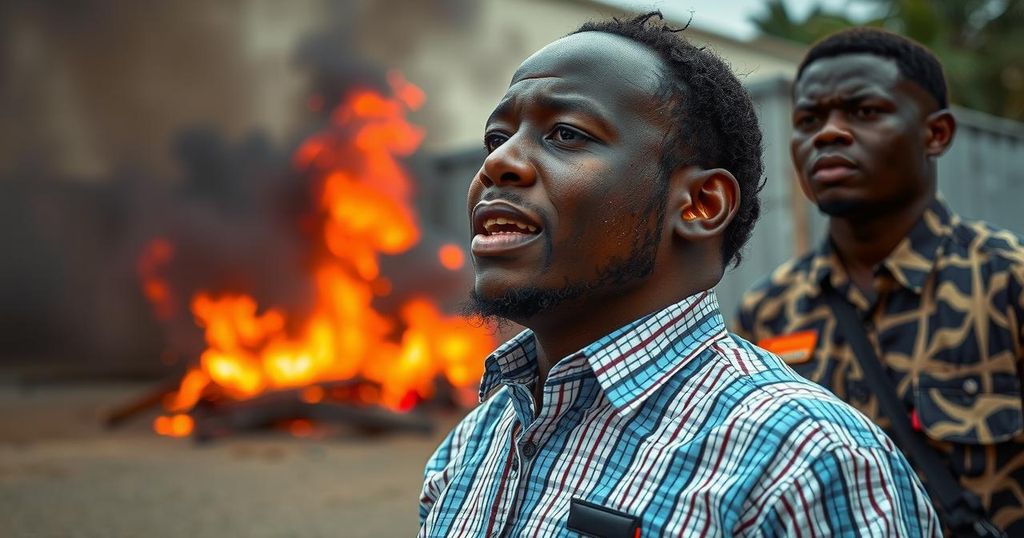Crime
AFRICA, AP, ARRESTS, ASSOCIATED PRESS, BEIRA, CONSTITUTIONAL COUNCIL, CRIME, DANIEL CHAPO, FR, FRELIMO, MAPUTO, MONDLANE, MOZAMBIQUE, PASCOAL RONDA, POLICE OF THE REPUBLIC OF MOZAMBIQUE, POLITICAL VIOLENCE, PROTESTS, REPUBLIC OF MOZAMBIQUE, THE CONSTITUTIONAL COUNCIL, VE, VENANCIO MONDLANE, VIOLENCE
Fatima Khan
0 Comments
Mozambique Faces Escalating Violence Following Court Ruling on Elections
Mozambique has experienced violent unrest following the court’s confirmation of Daniel Chapo as the winner of the disputed October elections, leading to at least 21 deaths, including two police officers. The violence was primarily instigated by supporters of losing candidate Venancio Mondlane, resulting in numerous injuries and extensive property damage. The situation remains tense with ongoing protests and threats of a nationwide shutdown as tensions persist throughout the country.
Maputo, Mozambique – Following the confirmation of Daniel Chapo as the winner of the controversial October 9 elections by Mozambique’s highest court, a surge of violence ensued, claiming the lives of at least 21 individuals, including two police officers. The country’s Interior Minister, Pascoal Ronda, reported during a news conference that the unrest was predominantly led by supporters of the defeated candidate, Venancio Mondlane, who secured 24% of the votes compared to Chapo’s 65%. In the wake of the court’s verdict, Mozambican cities, particularly Maputo and Beira, witnessed widespread rioting and looting, inciting fear and unrest among the population.
Reports indicate that within 24 hours of the ruling, authorities documented 236 violent incidents, resulting in 21 fatalities and numerous injuries, with 13 civilians and 12 police officers hurt during the clashes. Furthermore, Minister Ronda noted the destruction of property, including 25 vehicles, two of which belonged to the police, and assaults on 11 police subunits and a local penitentiary, leading to the escape of 86 inmates. As tensions simmered in the capital, Mondlane’s supporters, comprising predominantly young individuals, vowed to instigate a national shutdown commencing Friday, further exacerbating the already volatile situation.
The nation of approximately 34 million has been fraught with instability since the election results were announced, and the renewed protests have been met with force from security personnel. Thus far, the turbulent unrest has resulted in over 150 deaths related to the post-election violence, raising concerns among international observers.
The recent electoral controversy in Mozambique underscores the persistent tensions surrounding its political landscape. The Frelimo party, in power since independence in 1975, has faced challenges from opposition parties, most notably during the recent elections that were marred by accusations of fraud and mismanagement. The Constitutional Council’s ruling upheld the victory of Frelimo’s candidate, Daniel Chapo, igniting public outrage, especially among younger voters who supported Mondlane, representing a growing desire for change within the polity. Historical struggles between the ruling party and its opponents have highlighted long-standing grievances regarding governance and civil liberties, making Mozambique’s current unrest a pivotal moment in its political journey.
The situation in Mozambique reflects a critical juncture marked by civil unrest following the electoral confirmation of the ruling party’s candidate. As violence escalates and casualties rise, the implications of this unrest extend beyond immediate security concerns, indicating deeper societal divisions and unaddressed grievances among the populace. With calls for a national shutdown and the potential for continued violence, the country’s political stability remains precarious, drawing the attention of national and international stakeholders alike as they seek a resolution to the ongoing turmoil.
Original Source: www.whec.com




Post Comment